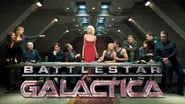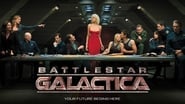stormrung
This is a johnny-come-lately review, I know. However, they just had a 15- year reunion for the show playing on Amazon Prime and I just binged on the entire series which I do not believe was available online until recently. I generally agree with those reviewers who have determined that the miniseries along with Seasons 1 and 2 are close to making the reimagined BSG a science fiction masterpiece. I loved the opening title sequences and especially the quick shot of Starbuch piloting a Viper out of the launch tube. The visuals in the title sequence are brilliant and get you excited for the upcoming episode. This is true for both the miniseries and Season 1 as well, as they both left me on the edge of my seat wanting more. Season 2 got a little weird with the Martial Law storyline, but I enjoyed the quest for the Arrow of Apollo. But that leads me to my first question:1) On Kobol, Boomer says that Cylons know more about the humans' religion than humans themselves, therefore, why wasn't the Arrow of Apollo more protected by the Cylons? They obviously knew the significance of the Arrow as proven by the ensuing fight between Starbuch and Six, however it was just left inside the display case at a bombed out museum. And the Cylons knew there was a human resistance on Caprica, so it doesn't seem feasible that they left it there because they thought it was safe to do so.2.) And while we're still on Caprica... one of the the most terrifying things that happened to Starbuch was her experience of being held as a breeder on a Cylon breeding farm. Apparently, there were farms all over the planet, not just the one that was destroyed by the resistance. I also assumed there were breeding farms on all 12 colonies. (Or was there?) So, what happened to thie Cylon plan to interbreed with humans? Why was the Boomer/Agathon experiment so important? If interbreeding wasn't working with human females, why not use human males, or at least their sperm? If you are doing this because you are concerned with the survival of the race, love doesn't seem necessary. 3) But...wait...if the Cylon master plan was to interbreed with humans, why did they nuke all 12 colonies? 4) But...wait...again...if they wanted the human population to be decimated by nukes, but then breed with them, exactly how was the new half human species supposed to live on the nuked planets?5.) Oh, but we also learn that Cylon "skin jobs" are not impervious to radiation, so nuking all 12 colonies seems senseless if the plan was to populate them with "skin jobs" and eventually a hybrid race. 6.) And staying on Caprica, was the Anders resistance the only sign of any humans left on the planet? Were any humans left on the 12 colonies? It would seem that if a moral decision had been made to rescue the survivors of the Cylon genocide, there should have been a plan to search for and rescue as many humans as possible.( And to find out more about the Cylon breeding farms!)BSG clearly "jumped the shark" in the Season 3 (and with a few episodes in the Season 2 if I'm being completely honest) and Season 4 was just damn near unwatchable. I managed to drudge through Season 4 in order to find out if some of the questions I had about the story were answered but I could not maintain my waning interest past Episode 13. I did watch the last episode of Season 4 in order to find out what happened. (But really, they discovered Earth through an emergency jump and found the new habitable planet by accident?) (And again, the Chief escapes any penalty for murder!!!)I would say that the exact point at which BSG became ill-fated was Episode 8: "Hero" of Season 3 where we learn that Adama believes that a special operation where he ordered a pilot to be killed, was in fact, the catalyst to to the Cylon War. So, that means we have Laura Rosslyn, the President of the Colonies, trying to fix an election, and Admiral Adama, not only plotting to kill an Admiral who was upholding the Code of Justice (Admiral Cain of the Pegasus), but he was also involved in a serious violation of International Law which may have been responsible for the genocide of 5 billion people and he ordered a murder to cover it up. That brings us to:7) Why weren't the Chief and Agathon punished...at all...for the homicide of the Pegasus crewman? Certainly, Admiral Adama had no problem killing mutineers and calling them all animals. Well, it seems that Gaeta and the rest of the mutineers had a point (Cylon collusion) but they were summarily executed for their rebellion. But in absolving Agathon and the Chief of any responsibility for the killing of the crewman makes it seem like Admiral Adama's justice is selective. Are we supposed to like Adama so much that we overlook this? Are we supposed to be so enamored of the difficult decisions to be made by people in power while in difficult situations that we accept this arbitrariness? I didn't and I see why Adama chose to live alone on the new not-Earth. So, "Why," I asked myself after Season 2, "do I care about these people?" Why am I expected to root for them, especially Adama and Rosslyn? In fact, I found myself rooting for Baltar and his ill-fated plan to settle the fleet on New Caprica. (I Later rooted for Gaeta and Tom Zarek because, at least, they appeared to have clean hands...oh that is until Zerak orders the entire Council of Twelve shot in cold blood for absolutely no reason during he and Gaeta's short-lived coup d'etat. It was primarily a military coup. Zerak should have taken his chances with the Council.)And then I stuck around for the ending of Season 3 in order to see Baltar's trial. Now, those of us who found the settlement of New Caprica an interesting development and a welcome relief from the confinement of a space-faring fleet, should remember that Baltar resisted signing any kind of death list. He only did so with tears streaming down his face while the Cylons held a gun to his head. And of course, we should also remember that Gaeta, who was Baltar's assistant, was the secret agent feeding information to the resistance suggesting that Baltar might have known about Gaeta's activities.This may have all come out very dramatically and emotionally during Baltar's trial,confirming him as one of the most complex, complicated, and interesting villains of all freakin' time! (Great acting by Callis throughout, by the way, except when they allowed him to improvise comedically with a Centurion in Season 4! Yuck.)But the trial fell flat mostly because the writers decided to showcase Lee Adama's transition from soldier to politician where he improbably gets the opportunity to plea Baltar's case for him. (Would never happen except in a Kangaroo Court.) So, Lee Adama becomes the star of the trial which is quite a pivotal event in the life of our desperate fleet, even though we had the introduction of a new character, Romo Lampkin, who was supposed to be a genius, outsider attorney, who was going to call out the powers that be for their soft tyranny which they are projecting onto Baltar. Instead we got Lee Adama defending Baltar who Lampkin himself had already identified as part of the nepotistic system he allegedly despised.8.) Admiral Adama clearly had a conflict of interest in this case. Why was he allowed to sit in judgment of Baltar? Oh, but we find out he voted for Baltar's innocence...was he just helping his son along on his new chosen path?9.) Romo Lampkin, even after he decries the nepotism of the Colonial civilization, is the most responsible person for anointing Lee Adama the new president. Why did they set this character up the way they did? He is essentially superfluous and a lackey for the system he allegedly hates. Boo!But Season 4 was just bad. Monumentally bad. I didn't care about the Cylon rebellion, about the the return to a scorched Earth, I lost interest in Starbuch after she seemingly lost all of her pathos and making most of the season about the relationship between the final five Cylons was boring, predictable, convoluted and immensely try-hard. I thought it was ludicrous that Colonel Tigh and his wife Ellen, went from being maladroit, co-dependent alcoholics and clearly in over their heads, to being the Adam and Eve of the Cylons and the people who had the destiny of two races in their hands. I could go on. But in general, I think that BSG failed because it decided to become a commentary on the times when it was being produced and that was the War on Terror and the after effects of 9/11. BSG suffered a dubious morality and faulty character development after Season 2 because it was reluctant to take a stand against the Military/Industrial Complex and the overall oligarchical power structure that controls the West. It also did not know where to stand on the developing technocracy and did not know what it thought of the transhumanist agenda. It's a shame, because it was obvious that a serious consideration of these things, along with a lot more philosophical issues, were in the hopper for BSG but they just did not materialize.













